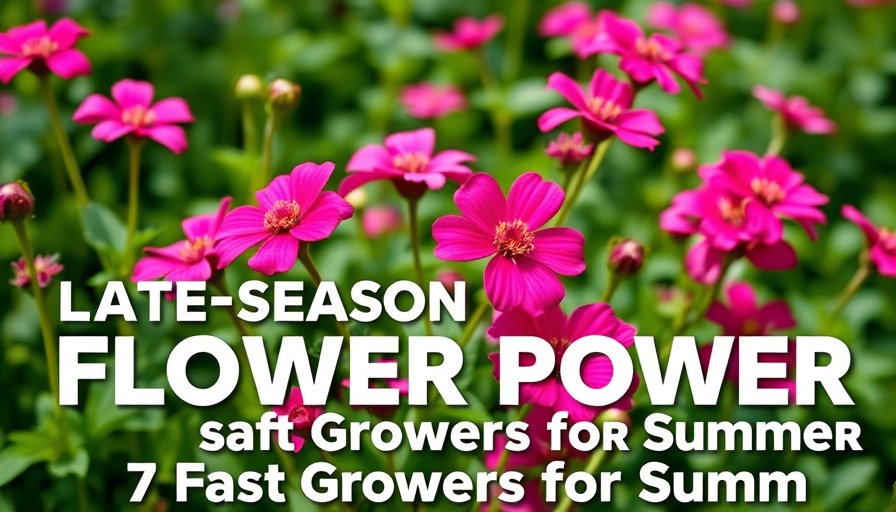
Don’t Delay — July is the Month for Colorful Blooms!
If you’re feeling like the gardening season has passed you by, think again! July is a fantastic time to breathe new life into your garden by planting vibrant annual flowers that not only thrive in the heat but also bring joy and color well into the fall. Whether you're a novice gardener or just looking to refresh your outdoor space in Metro Vancouver, there are plenty of exciting options to consider.
In '7 Annual Flowers You Can Still Plant in July (And Why You Should!),' the discussion focuses on vibrant annual flowers suitable for summer planting, which sparked our deeper analysis on these gardening tips.
1. Zinnias: The Overachievers of Summer
Zinnias are fantastic for those eager to see quick results. These cheerful flowers can go from seed to bloom in as little as six weeks! With their love for heat and sunshine, they thrive beautifully even as other plants begin to fade. Available in a plethora of colors and heights, zinnias are versatile and can take center stage in both borders and containers. Plus, the more you snip them for bouquets, the more flowers they’ll produce up until the first frost — a win-win for any gardener.
2. Marigolds: Summer Warriors
Marigolds are the quintessential annuals that add a splash of color to any garden. These hardy flowers germinate quickly and are well-suited to withstand July's sweltering heat. Not only do they look lovely, but they also serve a dual purpose by repelling common pests like aphids and whiteflies. If you’re looking to add beauty and a built-in pest deterrent to your flower beds or vegetable garden, consider choosing tall African marigolds or the compact French marigolds for smaller spaces.
3. Cosmos: For the Free-Spirited Gardener
Cosmos flowers embody artistic beauty with their tall, delicate stature. A fantastic choice for the busy gardener, these blooms prefer a little neglect and can flourish even in poor soil. With their quick growth and ability to attract beneficial pollinators, planting cosmos is an excellent way to enhance your garden’s ecosystem. In no time, you can enjoy a stunning display of pink, white, or deep magenta flowers that will keep your garden lively until fall.
4. Nasturtiums: Edible Elegance
If you want fast-growing flowers that are also edible, nasturtiums are your go-to. These charming blooms can sprout in just 30-40 days and thrive in hot, dry conditions. Aside from their beautiful appearance, both the flowers and leaves offer a peppery taste, perfect for adding flair to salads and other dishes. As an added bonus, nasturtiums can help repel pests like squash bugs, making them splendid companions in a vegetable garden.
5. Calendula: Brightening Up Late Summer
Often known as pot marigold, calendula is another surprising contender for July planting. While they’re cooler-weather lovers, planting them in late July can yield a burst of bright blooms just as many other flowers start to fade. Calendula's orange and yellow daisy-like flowers not only bring cheer but are also used in many skin-care products. With regular deadheading, they’ll reward you with blooms until October, especially in more temperate areas like Metro Vancouver.
6. Cleome: Vertical Interest
For those looking for height, cleome, or spiderflower, offers an elegant touch. This fast-growing annual stands tall, reaching between 3-5 feet high, and is perfect for adding vertical interest to your garden. Cleome blooms attract bees and butterflies, creating an animated environment in your space. Just remember to give these beauties space to grow!
7. Sunflowers: Delightful Dwarfs
Yes, you can plant sunflowers in July! Opt for dwarf varieties that bloom in as little as 60 days, making them perfect for pots or small garden borders. These cheerful giants thrive in full sun and can bring a smile to anyone’s face. Their presence is sure to attract pollinators, which further enriches your garden's biodiversity.
Join the Gardening Community!
In summary, July is far from a gardening dead zone — it’s an opportune time to plant remarkable annuals that thrive in the heat. With options ranging from zinnias to sunflowers, there’s no shortage of choices to brighten up your garden before fall. You might even find your new favorite flower! Which of these vibrant annuals are you excited to try? Join the conversation in the comments below!
Happy planting!
 Add Row
Add Row  Add
Add 




Write A Comment